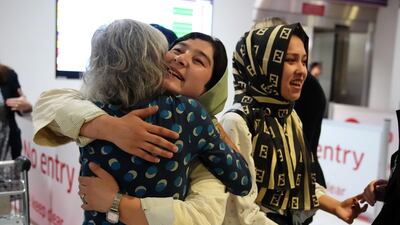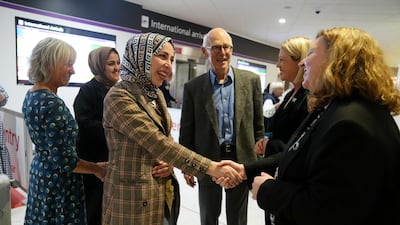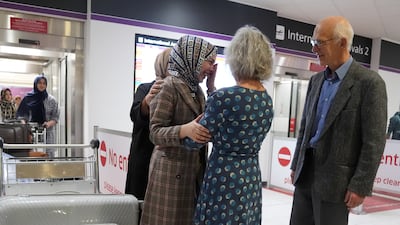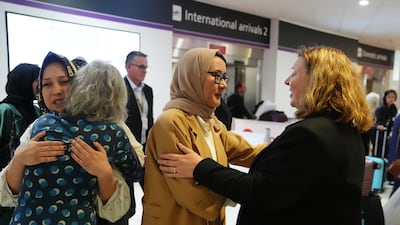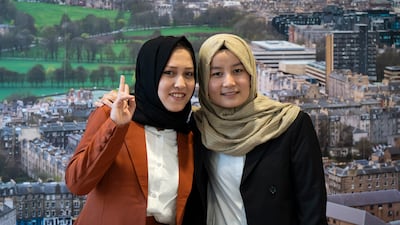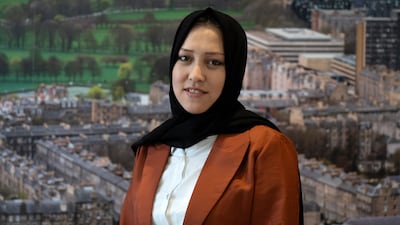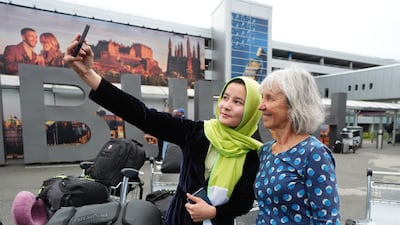Nineteen women from Afghanistan have arrived in Scotland to continue with their medical degrees, after the Taliban’s rise to power in their home country meant they were forbidden from education there.
The women, who are studying to become doctors, landed in Edinburgh despite a last-minute drama when two of them were stopped from boarding the plane.
UK consular staff in Islamabad in Pakistan – from where the women were flying – intervened, allowing them all to travel.
Afghan women living under Taliban rule – in pictures
There were tears from some of the students as they arrived at Edinburgh Airport on Monday, where they were met by John and Lorna Norgrove – the parents of Scottish aid worker Linda Norgrove, who died in Afghanistan in 2010.
The charity set up in her honour, the Linda Norgrove Foundation, has worked with both the Scottish and UK governments to bring the 19 young women to Britain.
Omulbanin Sultani, 21, said resuming her education at the University of St Andrews is “like coming to paradise, the place where we can study".
Ms Sultani said she has wanted to become a doctor from a young age but “cried all night” after the Taliban banned women from studying at university in Afghanistan in December 2022.
“We endured 1,000 days of suffering to reach this point, 1,000 days of being confined to our homes, 1,000 days of having our voices silenced, 1,000 days with nothing but tears and sorrow, 1,000 days of our lives wasting away,” she said.
Ms Sultani added that she wanted to help poor people, regardless of their country.
“Every country has poor people and rich people," she said. "Rich people can go to the doctor but the poor can’t, so my goal is to just help the poor people mostly. It doesn’t really matter if its Scotland or Afghanistan.”
Fellow student Zahra Hussaini, 19, said: “There are no words to express how I feel, believe me."
Ms Hussaini, who will be studying medicine at the University of Glasgow, said she was able to complete only the first year of her medical course in Afghanistan before women were barred from university, which was announced on the day she was meant to sit an exam.
“I used to think the Taliban had changed, in the 21st century they would not do such things, but their actions proved they have not changed.”
But she said if the situation in Afghanistan changes, she hoped to be able to work there as a doctor.
“Our journey here [to Scotland] will be long enough, maybe for eight years, nine years, and I think during this time many alterations and changes will come to Afghanistan," she said.
“I am hopeful that the situation won’t remain the same.”
Scotland Office Minister Kirsty McNeill and Scottish Education Secretary Jenny Gilruth were at the airport, along with Mr and Mrs Norgrove, to meet the women as they came off the plane.
The handshakes and hugs there marked the end of two years of effort by the charity and the two administrations.
Before arriving in Scotland, all the students had to undergo TB tests, English tests, and completed university interviews by Skype, before travelling to Pakistan, where they applied for visas to travel to the UK.
“We’re all delighted to have finally succeeded after so much frustration,” Mr Norgrove said after they landed in Scotland on Monday.
“Finally, these 19 incredibly talented young women get their future back with the opportunity of a tremendous education and a career. The alternative for them in Afghanistan wasn’t good.”
Afghan women train as midwives – in pictures
The Linda Norgrove Foundation has covered all the costs of getting the students to the UK, costing the charity – a small organisation with only one employee – a minimum of £60,000 ($78,000).
“Our heartfelt thanks go to all of our supporters, the politicians, civil servants and university staff who have made this possible,” Mr Norgrove said.
“It’s been particularly heartening at a time of such division to see the UK and Scottish governments working together to achieve such a positive outcome for these women.”
With both the Scottish and UK governments involved in the effort to bring the women out of Afghanistan, staff at the Scotland Office worked to ensure they had the visas needed to allow them to travel first to Pakistan and then on to the UK.
Meanwhile, the Scottish Government changed regulations, so that although the women have travelled on international student visas, they are not required to pay the fees that are charged to most international students who come to Scotland to study.
Ms Gilruth said that “very technical changes” to regulations were laid in the Scottish Parliament this year to achieve this.
“It’s a very technical change to the regulations we have made, this is pretty bespoke to this group of women because we recognised the need,” she said.
“We also recognised the danger to their lives, that is why we put in place these changes to bring them here safely.”
Speaking about the situation the 19 students had faced in their home country, Ms Gilruth said: “Fundamentally, the women’s ability and their right to learn, we know in Afghanistan they were unable to learn and we in Scotland have a view on that.
“We don’t support that approach, we want to help women learn, we want to help them to reach their potential.”
Ms Gilruth said she was “really pleased” the governments, together with the charity, had been able to find a way to bring the women to Scotland.
Scotland Office staff arranged for the women to stay in the Cargilfield private boarding school in Edinburgh, where with the term starting later than in most Scottish schools, there was plenty of room for the students.
Online retailer Amazon provided welcome packs for them, so they have the essentials needed when they move on to their universities.
Ms McNeill paid tribute to Linda Norgrove, who was taken hostage while working in Afghanistan before being killed during a rescue operation in 2010.
The Scotland Office Minister said it had been “incredibly emotional” to welcome the students.
“The reason they are in Scotland in particular is because of the incredible foundation, the Linda Norgrove Foundation set up in memory of a Scottish aid worker killed in Afghanistan,” she added.
“Their family came together after her death to support women in particular in Afghanistan, women and children and the wider people of Afghanistan and part of honouring her legacy and her commitment to humanity was helping these women come here to Scotland.”
“The UK government, in particular the Scotland Office has been working with the Scottish Government and the family of Linda Norgrove through their foundation, we have helped make sure that people will be able to get visas, to make sure they get practical support so they get a fantastic welcome in Scotland, and I know their universities and the communities that surround them are waiting with open arms for these women to continue their education,” Ms McNeill said.



